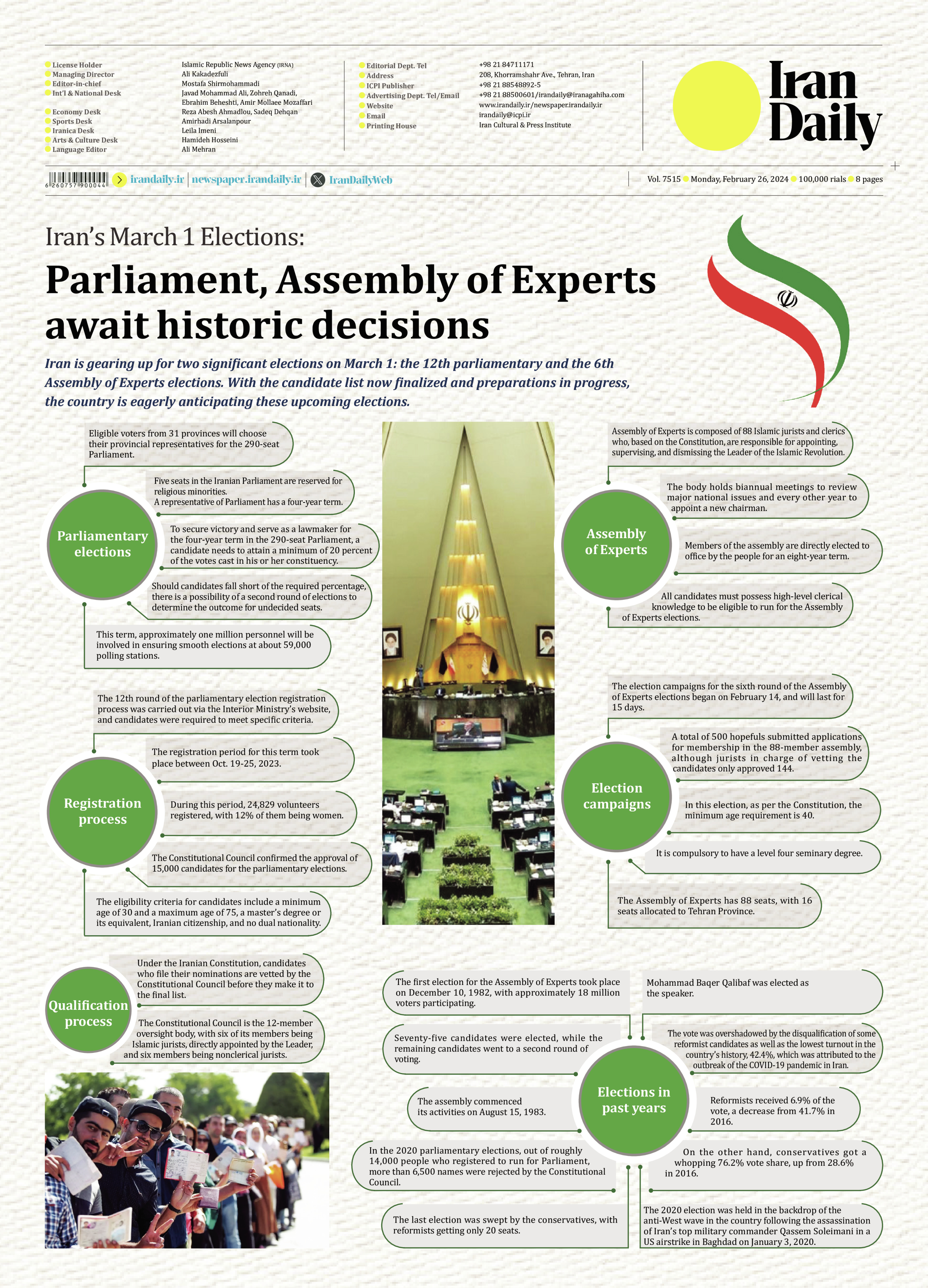
Iran’s March 1 Elections:
Parliament, Assembly of Experts await historic decisions
Iran is gearing up for two significant elections on March 1: the 12th parliamentary and the 6th Assembly of Experts elections. With the candidate list now finalized and preparations in progress, the country is eagerly anticipating these upcoming elections.
Parliamentary elections
Eligible voters from 31 provinces will choose their provincial representatives for the 290-seat Parliament.
Five seats in the Iranian Parliament are reserved for religious minorities.
A representative of Parliament has a four-year term.
To secure victory and serve as a lawmaker for the four-year term in the 290-seat Parliament, a candidate needs to attain a minimum of 20 percent of the votes cast in his or her constituency.
Should candidates fall short of the required percentage, there is a possibility of a second round of elections to determine the outcome for undecided seats.
This term, approximately one million personnel will be involved in ensuring smooth elections at about 59,000 polling stations.
Registration process
The 12th round of the parliamentary election registration process was carried out via the Interior Ministry’s website, and candidates were required to meet specific criteria.
The registration period for this term took place between Oct. 19-25, 2023.
During this period, 24,829 volunteers registered, with 12% of them being women.
The Constitutional Council confirmed the approval of 15,000 candidates for the parliamentary elections.
The eligibility criteria for candidates include a minimum age of 30 and a maximum age of 75, a master’s degree or its equivalent, Iranian citizenship, and no dual nationality.
Qualification process
Under the Iranian Constitution, candidates who file their nominations are vetted by the Constitutional Council before they make it to the final list.
The Constitutional Council is the 12-member oversight body, with six of its members being Islamic jurists, directly appointed by the Leader, and six members being nonclerical jurists.
Assembly
of Experts
Assembly of Experts is composed of 88 Islamic jurists and clerics who, based on the Constitution, are responsible for appointing, supervising, and dismissing the Leader of the Islamic Revolution.
The body holds biannual meetings to review major national issues and every other year to appoint a new chairman.
Members of the assembly are directly elected to office by the people for an eight-year term.
All candidates must possess high-level clerical knowledge to be eligible to run for the Assembly of Experts elections.
Election
campaigns
The election campaigns for the sixth round of the Assembly of Experts elections began on February 14, and will last for 15 days.
A total of 500 hopefuls submitted applications for membership in the 88-member assembly, although jurists in charge of vetting the candidates only approved 144.
In this election, as per the Constitution, the minimum age requirement is 40.
It is compulsory to have a level four seminary degree.
The Assembly of Experts has 88 seats, with 16 seats allocated to Tehran Province.
Elections in past years
Mohammad Baqer Qalibaf was elected as
the speaker.
The first election for the Assembly of Experts took place on December 10, 1982, with approximately 18 million voters participating.
The vote was overshadowed by the disqualification of some reformist candidates as well as the lowest turnout in the country’s history, 42.4%, which was attributed to the outbreak of the COVID-19 pandemic in Iran.
Seventy-five candidates were elected, while the remaining candidates went to a second round of voting.
The assembly commenced
its activities on August 15, 1983.
Reformists received 6.9% of the vote, a decrease from 41.7% in 2016.
On the other hand, conservatives got a whopping 76.2% vote share, up from 28.6%
in 2016.
In the 2020 parliamentary elections, out of roughly 14,000 people who registered to run for Parliament, more than 6,500 names were rejected by the Constitutional Council.
The 2020 election was held in the backdrop of the
anti-West wave in the country following the assassination of Iran’s top military commander Qassem Soleimani in a US airstrike in Baghdad on January 3, 2020.
The last election was swept by the conservatives, with reformists getting only 20 seats.
.






